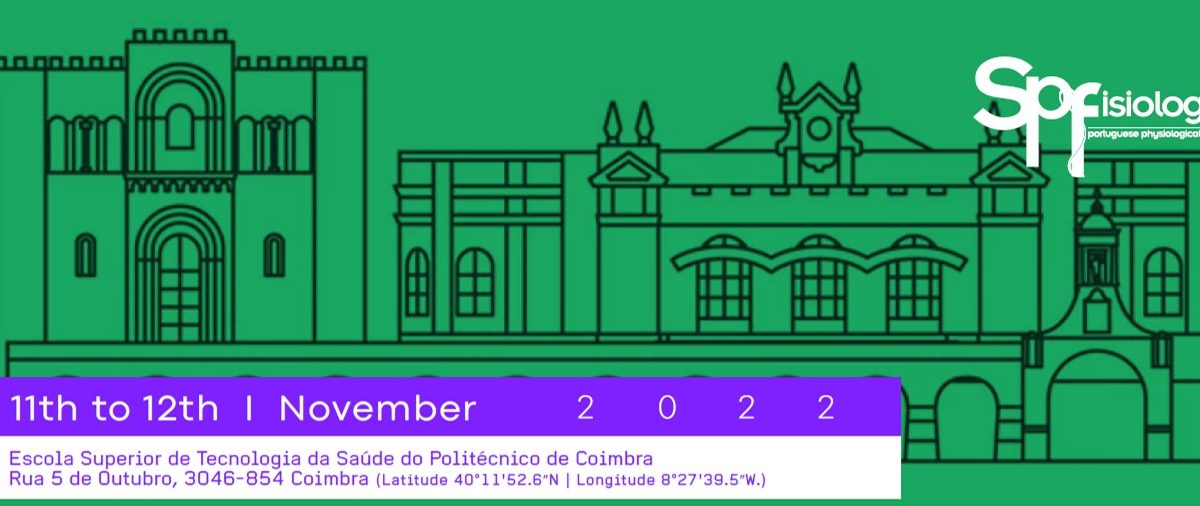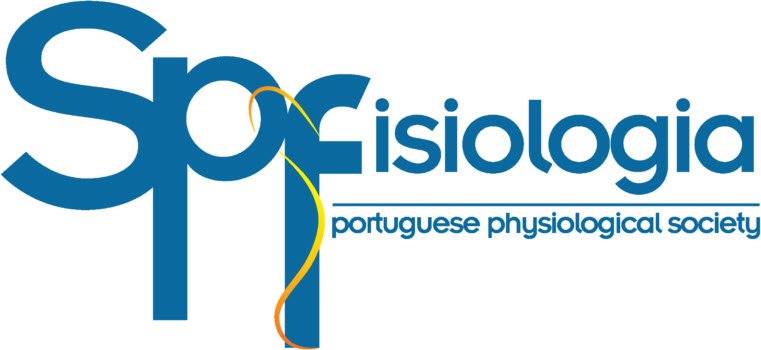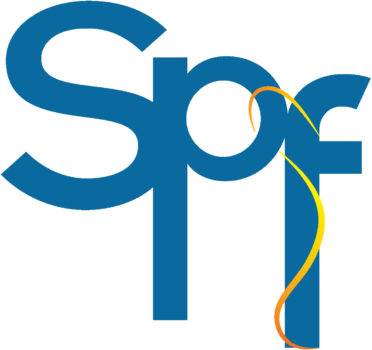2º Congresso Internacional de Fisiologia SPFis - 2022
O 2º Congresso Internacional da Sociedade Portuguesa de Fisiologia realizou-se em Coimbra, Portugal, a 11 e 12 de Novembro de 2022, na Escola Superior de Tecnologia da Saúde do Politécnico de Coimbra.

Programa
Pode consultar o flyer do programa detalhado aqui [+]
Livro de Resumo disponível aqui[+] (requer login do portal da Frontiers – https://doi.org/10.3389/978-2-88971-027-0)
Sexta feira – 11 de novembro
Workshops
- Workshop 1 “Exploring biosignals using BITalino“ by PLUX
- Workshop 2 “new tools to explore hypoxia“ by TypeSolution
Sessão de abertura com a presença e intervenções de:
- Presidente do Instituto Politécnico de Coimbra e Diretor da Escola Superior de Tecnologia da Saúde
- Ministro da Ciência, Tecnologia e Ensino Superior (representado)
- Susan Wray, Int Union Physiological Societies and Federation of European Physiological Societies (FEPS) Presidente
- Luis Monteiro Rodrigues, Presidente da SPFIS
Seminario I – Teaching Physiology
- Moderators: Vicente Martinez Perea -The Spanish Physiological Society and Carlos Nunes Filipe – Nova Medical School
- “Human Physiology in the Portuguese higher education system – a current view” L. Monteiro Rodrigues et al., CBiOS Lisboa, U.Lusofona
- ”Clinical Physiology in Portugal – a recent history” Telmo Pereira, ESTeSC, I.P.Coimbra
- “Novel pedagogical tools in the teaching of medical physiology – is new always better?” Diogo Santos Ferreira, Dep. Surgery and Surgery & UnIC@RISE, Fac. Medicine, U.Porto
- “Human vs. machine learning: enhancing student metacognition via the active learning of physiology” Jorge Ascenção Oliveira, Dep Pharmacology, Fac. Pharmacy-U.Porto
- “Implementation of physiology and pathophysiology teaching in a novel Portuguese undergraduate medical curriculum” André Leite-Moreira, U.Aveiro Dep Medical Sciences
- Round table and open discussion
Sábado – 12 de novembro
Seminário II Who What Where – Show room da Pesquisa Fisiológica em Portugal
- Apresentações curtas de laboratórios nacionais representativos: BioISI FCUL ; CBIOS ULusofona; CIAFEL | FADEUP ; CIDESD | UTAD; DCF FMUP; IBEB FCUL; ICBAS MedInUP; iCBR FMUC; IF CCUL FMUL; IF FMUC; NOVA FCMUNL; IT-IST UL; LABINSAUDE IPC
Wrap-up
- Moderador: Adelino Leite-Moreira, DCF Fac. Medicine U.Porto
Assembleia Geral da SPF
Eleição dos novos órgãos para o período de 2022-2025
Sessões de Pódio – Apresentações de pódio selecionados
Moderadores: Ana Sofia Fernandes, CBIOS ULusofona e Telmo Pereira, ESTeSC IPC
Neurofisiologia
- CL (21493) – VPAC1 and VPAC2 receptors are opposingly altered in the Li2+-pilocarpine model of temporal lobe epilepsy. – Marta Bento et.al; 1 – Departamento de Química e Bioquímica, and 2-Biosystems & Integrative Sciences Institute (BioISI), Faculdade de Ciências da Universidade de Lisboa, Lisboa, Portugal.
- CL (21505) – β-adrenoceptor antagonists affect the establishment of traumatic memories and anxiety-like behaviour in a post-traumatic stress disorder mice model – Rafaela Seixas et.al; 1 – Department of Immuno-Physiology and Pharmacology, Laboratory of General Physiology, School of Medicine and Biomedical Sciences (ICBAS), University of Porto (UP); 2 – Center for Drug Discovery and Innovative Medicines, University of Porto (MedInUP); 3 – Department of Biomedicine, Faculty of Medicine, University of Porto (FMUP)
- CL (21507) – Contextual fear memory impairment in adrenaline-deficient mice may be related to downregulation of the M4 muscarinic receptor subtype in the hippocampus– Ana Oliveira et.al
1 – Department of Immuno-Physiology and Pharmacology, Laboratory of General Physiology, School of Medicine and Biomedical Sciences (ICBAS), University of Porto (UP); 2 – Center for Drug Discovery and Innovative Medicines, University of Porto (MedInUP); 3 – Institute for Molecular and Cell Biology (IBMC), Institute for Research & Innovation in Health (I3S), University of Porto
Integrated – Metabolism
- CL (21433) – WWOX inhibition by Zfra1-31 ameliorates brain mitochondrial dysfunction and oxidative stress in a mouse model of type 2 diabetes– Cristina Carvalho et.al; 1 – Center for Neuroscience and Cell Biology (CNC), University of Coimbra, Portugal; 2 – Institute for Interdisciplinary Research (III), University of Coimbra; 3 – Center for Innovation in Biomedicine and Biotechnology (CIBB); 4 – PhD Program in Experimental Biology and Biomedicine (PDBEB), University of Coimbra, 3030-789 Coimbra, Portugal; 5 – Institute of Physiology, Faculty of Medicine, University of Coimbra, Coimbra, Portugal
- CL (21595) – Methylglyoxal and high fat diet negatively impact perivascular adipose tissue contributing to vascular dysfunction in rat models of metabolic syndrome – Adriana Malheiro et.al
1 – Institute of Physiology, iCBR, Faculty of Medicine, University of Coimbra, Portugal - CL (21495) – Physiology of body composition – how do vegetarians and omnivores differ? – Cíntia Ferreira-Pêgo et.al; 1 – CBIOS – Universidade Lusófona’s Research Center for Biosciences & Health Technologies
CL (21500) – Long-term management of metabolic diseases after bariatric surgery – Cláudia Amaro Dos Santos et.al; 1 – CBIOS
Integrated – Cardiovascular
- CL (21631) – Ketones impact on cardiac outcomes in a rat model of HFpEF – Alexandre Gonçalves et.al; 1 – Faculdade de Medicina da Universidade do Porto (FMUP); 2 – Instituto de Ciências Nucleares Aplicadas à Saúde; 3 – Instituto de Investigação Clínica e Biomédica de Coimbra (iCBR); 4 – University Hospital Würzburg
- CL (21437) – Therapeutic implications of urocortin-2 in Heart Failure with preserved Ejection Fraction – Inês Vasconcelos et.al; 1 – Faculty of Medicine University of Porto, UnIC-RISE, Department of Surgery and Physiology, Porto, Portugal; 2 – Faculty of Nutrition and Food Sciences, University of Porto, Porto, Portugal
- CL (21503) – Cardiac stretch-induced compliance is impaired in a rat model of heart failure with preserved ejection fraction – André Leite Moreira et.al; 1 – Faculdade de Medicina da Universidade do Porto; 2 – UnIC @ RISE; 3 – Centro Hospitalar Universitário São João
- CL (21644) – Muscle reoxygenation kinetics during six different variations of push-up exercise – Andreia Teixeira et.al; 1 – University of Trás-os-Montes e Alto Douro, Vila Real, Portugal; 2 – Department of Sports Science, Exercise and Health; 3 – Research Center in Sports Sciences, Health Sciences and Human Development (CIDESD), Vila Real, Portugal
- CL (21659) – SALUS – an IoT wearable device for the assessment of cardiovascular health- João Brito et.al; 1 – Instituto de Biofísica e Engenharia Biomédica, Faculdade de Ciências da Universidade de Lisboa; 2 – Unidade de Sincope, Cardiologia, Hospital de Santa Marta, Centro Hospitalar e Universitário de Lisboa Central; 3 – Medicina 2.4 Núcleo de Investigação Arterial, Centro Hospitalar e Universitário de Lisboa Central, NOVA Medical School
Discussão
Visita a expositores e cartazes
Prémios e Distinções
- Prémio de Ciência , que se destina a distinguir a inovação e o impacto societal na educação e investigação em fisiologia. Pode consultar aqui [+] Este Prémio é patrocinado por:

- Prémio Young Scientist Travel Award, que se destina ao apoio à deslocação do jovem cientista. Pode consultar aqui [+] Este Prémio é patrocinado por:

Considerações de Encerramento
Brinde de encerramento com champanhe
Principais Colaboradores e Patrocinadores
Pode consultar aqui [+] mais detalhes e galeria fotográfica.

